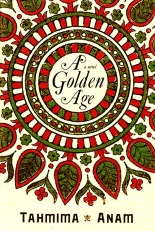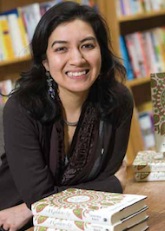A Golden Age
Tahmina Anam

Hard cover: 264 pages
|
When reading Tahmima Anam’s moving debut novel, A Golden Age, it will be helpful to keep two things close at hand: a box of tissues and the number to a really good Indian takeout. The story of a widowed mother’s fight to keep her son and daughter safe during Bangladesh’s war for independence functions as both a riveting tale and a lament for the atrocities the people suffered during Pakistan’s invasion in 1971. But the novel is also full of beauty, with Anam celebrating the poetry and food of her homeland. A longing for samosas and biryani is guaranteed to hit a reader by the third chapter. I’d recommend eating before continuing, because the horrors that left an estimated 3 million dead and turned 10 million more into refugees is sure to roil your stomach. Between 1948 and 1971, Bangladesh was actually known as East Pakistan. The British attached the halves during the partition of India because they both had Muslim majorities. Unfortunately, the two sides didn’t share a common geography, language, or culture.”What sense did it make, to have a country in two halves, poised on either side of India like a pair of horns?” Anam’s heroine wonders at one point. Rehana Haque actually embodies the divided nature of Pakistan: An Urdu-speaking woman from the wealthier west, she’s made the Bengali east her home. And years before the rest of her country, she suffers an invasion from western Pakistan. In 1959, Rehana’s children are taken from her, when her brother-in-law from Lahore has the young widow declared an unfit mother in court. (“Milord, Mrs. Haque is distressed; she needs her rest,” the childless man declares in a breathtaking piece of self-justification.) It takes Rehana more than a year to raise enough money to bribe the judge and bring her children home. More than a decade later, her children now university students, Rehana is still racked by guilt, and the forced separation has defined her life. On the night of a neighbor’s engagement party in March 1971, Pakistan invades after Bangladesh declares independence. While Rehana and her children eat lamb and try to navigate the horrible awkwardness arising from the fact that her son, Sohail, has been in love with the engaged young woman since both were children, soldiers target the university and the Hindi sections of Dhaka, the capital. “Oblivious, they devoured the roast lamb, smacking their lips and sucking on the bones. Later they would remark upon the crudeness of their hunger.” Outraged by the invasion, both Sohail and his sister Maya want to join the rebels. Rehana is torn between admiration for her children’s bravery and terror for their safety. “There was a part of her that wanted to allow her children anything – any whimsy, any zeal, any excess,” while “another part of her wanted them to have nothing to do with it all, to keep them safe at home.” But, just as a decade earlier, they leave her behind. Maya becomes a press writer for the nationalists in Calcutta, while Sohail joins a rebel cell near home. Only this time, over the course of the novel, Rehana learns how to let them go. As her friends hide in their homes and pretend the war doesn’t exist, Rehana finds herself becoming an involuntary revolutionary. She starts by sewing blankets made from her silk saris. Then she lets Sohail’s rebel friends set up a base in her rental property – vacant since her Hindu tenants fled the persecution by the Pakistani army – and bury guns under her rosebushes. At first, Rehana is motivated less by nationalist fervor and more by a desire to make her son happy. As his requests become more and more dangerous, Rehana is oddly delighted: “It was the most distasteful, gruesome task,” she thinks when Sohail begs for another favor. “But it was also an opportunity. Her son was giving her another chance to atone. The years of slavish devotion, the mothering … she had always known they would not be enough. She could not help welcoming the prospect of some new sacrifice.” Many comparisons have been made between Anam and Monica Ali, another highly talented Bangladeshi writer who lives in Britain. But where Ali’s “Brick Lane,” followed the immigrant experiences of a woman living in London, Anam focuses wholly on her native country. “A Golden Age” is the first of a planned trilogy covering the birth of Bangladesh. Since the novel just keeps getting stronger as it progresses – building to a doozy of an ending – one can only imagine great things from the sequel. ( Yvonne Zipp, The Christian Science Monitor, 8 January 2008 ) Reviews
|

 Tahmina Anam
Tahmina Anam